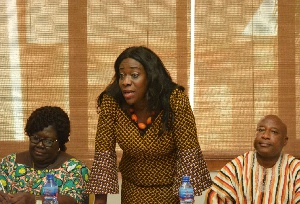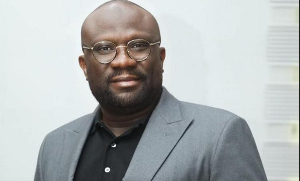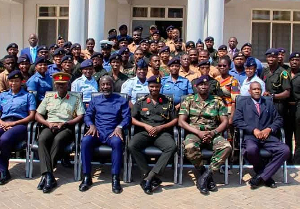Tourism, Arts and Culture Minister, Catherine Ablema Afeku, has called for dedicated periods on the schools' timetable for the teaching of Culture.
“We need to have a Culture syllabus to teach the way of life of our people as well as the relevance of culture in a digital age. Culture and the Arts should be a serious subject of study,” she said.
The Minister argued that the days when a child or student who chose Arts and Culture as a course of study was regarded as a failure should be gone.
Catherine Afeku made these suggestions at a ceremony to inaugurate a 27-member national committee set up by her Ministry to review the Culture Policy of Ghana.
The committee is made of eminent cultural advocates and representatives of domains in the Arts such as music, film, dance, fashion and culinary arts.
It is headed by Professor George Panyin Hagan, one-time Chairman of the National Commission on Culture and former flagbearer of the Convention People’s Party.
Debunking the conception that culture ran counter to modernity, the Minister charged the committee to come up with a revised policy that would enable inventions in the traditional sphere, especially by the aged, to be digitalized and marketed through Instagram, microfiche and Pinterest, among other digital applications.
Catherine Afeku charged the committee to give the policy more flesh to enable it to deal with the challenges that plagued the existing policy, namely lack of dedicated funding for implementing the recommendations, and effective decentralization of the policy at all levels.
On the National Festival of Arts and Culture (NAFAC), she called for dedicated funding to ensure that the festival was effectively celebrated “so that NAFAC will really be a showcase of national culture” and its effects felt at all levels.
In his speech accepting the chairmanship of the committee, Prof Hagan, in whose tenure as Chairman of the Commission on Culture the existing policy was crafted and promulgated, entreated Ghanaians not to look down on culture.
“Culture is the salt with which we must eat every meal,” he said, cautioning that “It should not be an afterthought.“
Executive Director of the National Commission on Culture, Edna Nyame, said while the 2004 Policy remained the single most important document from which all sectors - from Architecture to Culture -theoretically derived their raison d’etre, “it is undisputed that after 14 years, issues in, and the practice of, culture have been affected by technology;” hence, the need for the policy review.

Other members of the committee are Honourable Joseph Osei Owusu, first Deputy Speaker of Parliament, Nana Kobina Nketsia, Omanhen of Essikado, Professor Esi Sutherland Addy, chairperson and Co-convener of the Ghana Culture Forum, Professor Abdulai Salifu Asuro, chairman of the Ghana Folklore Board, Mr Akunu Dake, CEO of Heritage Development, Professor Kofi Agyekum, Dean of the School of Performing Arts, Nana Kwesi Gyan Apenteng, immediate past chairman of the National Media Commission and Apagyahene of Akyem Tafo.
Others are Professor Kofi Anyidoho, a poet and professor of English, Professor Akosua Adomako Ampofo, a lecturer at the Institute of African Studies and Mr Boateng, of the National Commission on Culture and Mr Enimil Ashon, Communication Consultant.
The rest are representatives of the main artistic domains in Ghana, namely Visual Arts Association, Musicians Union of Ghana, Ghana Fashion Designers Association, Ghana Academy of Film and Television Arts (GAFTRA) and the Ghana Dance Association.
The existing Culture Policy, enacted in 2004, was dedicated to the realization of the vision of Ghanaians “to respect, preserve, harness and use their cultural heritage and resources to develop a united, vibrant and prosperous national community with a distinctive African identity.”
A member of the committee, commenting on the relevance of the occasion, found It “instructive to note that the 2004 policy was promulgated under the leadership of President J.A. Kufuor. By God’s grace, this reviewed and enriched policy will come into effect during the tenure of President Nana Addo Dankwa Akufo Addo”.
Entertainment of Thursday, 20 December 2018
Source: Samuel Dowuona













